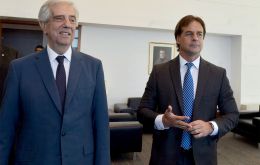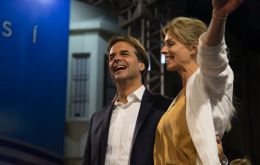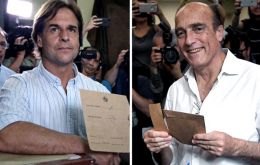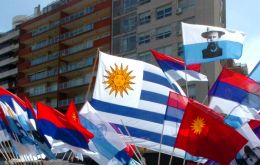MercoPress. South Atlantic News Agency
Tag: Broad Front
-
Tuesday, December 3rd 2019 - 09:50 UTC
Uruguay president elect hopes pragmatism prevails over ideology in Mercosur

Mercosur faces a tense future, the president-elect of Uruguay said on Monday, referring to a diplomatic spat between regional heavyweight economies Brazil and Argentina. Brazil’s right-wing leader Jair Bolsonaro and Argentina’s incoming leader, left-leaning Peronist Alberto Fernandez, have sparred openly.
-
Friday, November 29th 2019 - 09:58 UTC
Uruguay's incumbent candidate salutes president elect Lacalle Pou; transition talks begin next Monday

Luis Lacalle Pou of the center-right National Party won Uruguay’s presidency after his rival conceded four days after a runoff election. A second vote count by the country's Electoral Court confirmed and widened the neck to neck difference between the president elect and the incumbent candidate
-
Monday, November 25th 2019 - 09:59 UTC
Uruguay's presidential runoff results delayed because of the very tight results

Uruguay Sunday's presidential runoff results have been so tight that the Electoral Court will only make a definitive announcement sometime late this week after it has completed counting all votes, including some 34.000, classified as “observed”. This is because the difference between the two candidates is some 29.000 votes.
-
Saturday, November 23rd 2019 - 09:59 UTC
Uruguay Sunday's presidential runoff, a multicolor power switching with strong winds of change

This Sunday 2.7 million Uruguayans will cast their ballots in the presidential runoff, which according to all opinion poll forecasts, will have Luis Lacalle Pou, the leader of an opposition multicolor alliance as head of the Executive next March, but equally significant, power switching, it will mark the end of fifteen years of almost undisputed predominance of a catch-all coalition, Broad Front, which ruled South America's smallest country for three consecutive five-year mandates.
-
Monday, October 28th 2019 - 09:58 UTC
Winds of change in Uruguay: ruling coalition stumbles, next government will be “multicolor”

Winds of change have swept in Uruguay. After fifteen years in office, and enjoying an absolute legislative majority, the Broad Front could lose control of the Executive on 24 November, when a runoff is scheduled among the two most voted candidates this Sunday.
-
Saturday, October 26th 2019 - 09:59 UTC
Uruguay votes on Sunday with a strong forecast change in the air

Uruguayans head to the polls on Sunday to elect a new president, 30 senators and 99 Lower House members. If none of the eleven presidential candidates manages 50% of cast votes plus one on 27 October, a runoff between the two hopefuls with most support is scheduled for 24 November.
-
Wednesday, October 23rd 2019 - 21:54 UTC
Uruguay Sunday’s general election: To a second ballotage and without parliamentary majority

On Sunday, October 27, in Uruguay, a new president, and Parliament will be elected. According to pollsters, the same parties as in 2014, the official Frente Amplio (FA, Broad Front) and the conservative National Party, will go on second ballotage in November. However, the novelty is that the Legislature will be made up of a minimum of six parties (a historical record) and a maximum of nine.
-
Monday, July 1st 2019 - 09:58 UTC
Uruguay presidential election campaign takes off, following on Sunday's party primaries

A former mayor of the city of Montevideo, and a Senator, head of the opposition are the most serious candidates to be elected the next Uruguayan president according to the results of the political parties' primaries held this Sunday. General elections in Uruguay are scheduled for the end of October, and a month later a runoff in case no candidate manages a 50% majority of votes cast.
-
Thursday, June 20th 2019 - 09:59 UTC
Uruguay holding presidential primaries on 30 June: three main candidates outstand

The last Sunday of June Uruguay will be holding presidential primaries when political parties will be choosing their candidates for the coming election scheduled for next October. There are over a dozen hopefuls, but only three, maybe four or five can be considered sufficiently strong as to be taken into account. After all from one of these parties will come the next president of Uruguay, since there is no consecutive reelection in Uruguay.
-
Friday, December 21st 2018 - 19:39 UTC
Uruguayan Senator Daniela Payssé dead at 72

Uruguayan Broad Front (FA) Senator Daniela Payssé passed away Friday of a heart attack in Montevideo, Tourism Minister Liliam Kechichian announced. Payssé was 72.
